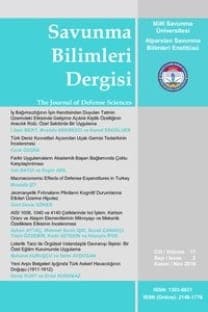Entellektüel sermayenin örgüt performansına etkisi: Savunma sanayisinde bir araştırma
The effect of intellectual capital on organizational performance: A research at defence industry
___
- Andriessen, D., 2001. Weightless Wealth: Four Modifications to Standard IC Theory. Journal Of Intellectual Capital, 2(3).
- Brennan, N. ve Connell, B., 2000. Intellectual Capital:Current Issues and Policy Implications. Journal of Intellectual Capital, 1(3).
- Bontis, N., 1998. Intellectual Capital:An Exploratory Study That Develops Measures and Models. Management Decision, 36(2).
- Bontis, N., Keow, W.C.C. ve Richardson, S., 2000. Intellectual Capital and Business Performance in Malaysian Industries. Journal of Intellectual Capital, 1(1).
- Carroll, R.F. ve Tansey, R.R., 2000. Intellectual Capital in the New Internet Economy - It's Meaning, Measurement and Management for Enhancing Quality. Journal of Intellectual Capital, 1(4).
- Çelik, A.E. ve Perçin, S., 2000. Entelektüel Sermayenin İşletme Bazında Ölçülmesi ve Değerlendirilmesi. Muhasebe ve Denetime Bakış Dergisi, 1(2).
- Edvinsson, L. ve Sullivan, P., 1996. Developing a Model for Managing Intellectual Capital. European Management Journal, 14(4).
- Edvinsson, L. ve Malone, M.S., 1997. intellectual Capital. London: Piatkus.
- Johanson, U., 1999. Mobilising Change: Characteristics of Intangibles Proposed by 11 Swedish Firms. OECD International Symposium, Measuring and Reporting Intellectual Capital: Experience, Issues, and Prospects, Amsterdam, 9-11 June.
- Mouritsen, J., 1998. Driving Growth: Economic Value Added versus Intellectual Capital. Management Accounting Research, 9.
- Pablos, P.O., 2004. Measuring and Reporting Structural Capital: Lessons From European Learning Firms. Journal of intellectual Capital, 5(4).
- Petrash, G., 1996. Dow's Journey to A Knowledge Value Management Culture. European Management Journal, 14(8).
- Seetharaman A., Low, K.L.T. ve Saravanan, A.S., 2004. Comparative Justification on Intellectual Capital. Journal of Intellectual Capital, 5(4).
- Sveiby, K.E., 1998. Measuring Intangibles and Intellectual Capital - An Emerging First Standard, www.sveiby.com, Agust. (04 Ocak 2006).
- Stewart, T.A., 1997. Entelektüel Sermaye. İstanbul: BZD Yayıncılık.
- ISSN: 1303-6831
- Yayın Aralığı: Yılda 2 Sayı
- Başlangıç: 2002
- Yayıncı: Milli Savunma Üniversitesi Alparslan Savunma Bilimleri ve Millî Güvenlik Enstitüsü
Paralel makineli çizelgeleme problemlerinde öğrenme etkili hazırlık zamanları
ENTELEKTÜEL SERMAYENİN ÖRGÜT PERFORMANSINA ETKİSİ: SAVUNMA SANAYİSİNDE BİR ARAŞTIRMA
Determination of Effective Parameters on Ion Energy of a Plasma Ion Source Using O2
BİLGİSAYARLA ADIM MOTORLARIN KONTROLÜ VE TAHRİBATSIZ TEST UYGULAMALARINA SAĞLADIĞI KAZANIMLAR
Yavuz EGE, Mustafa GÖKTEPE, Osman KALENDER
Bilgisayarla adım motorların kontrolü ve tahribatsız test uygulamalarına sağladığı kazanımlar
Mustafa GÖKTEPE, Yavuz EGE, Osman KALENDER
Manyetik Anomali ile Denizaltıların Algılanması ve Yönlerinin Belirlenmesi
Cengiz TAVUKÇUOĞLU, H. Nejat BASIM
Determination of effective parameters on ion energy of a plasma ion source using $O_2$
Entellektüel sermayenin örgüt performansına etkisi: Savunma sanayisinde bir araştırma
